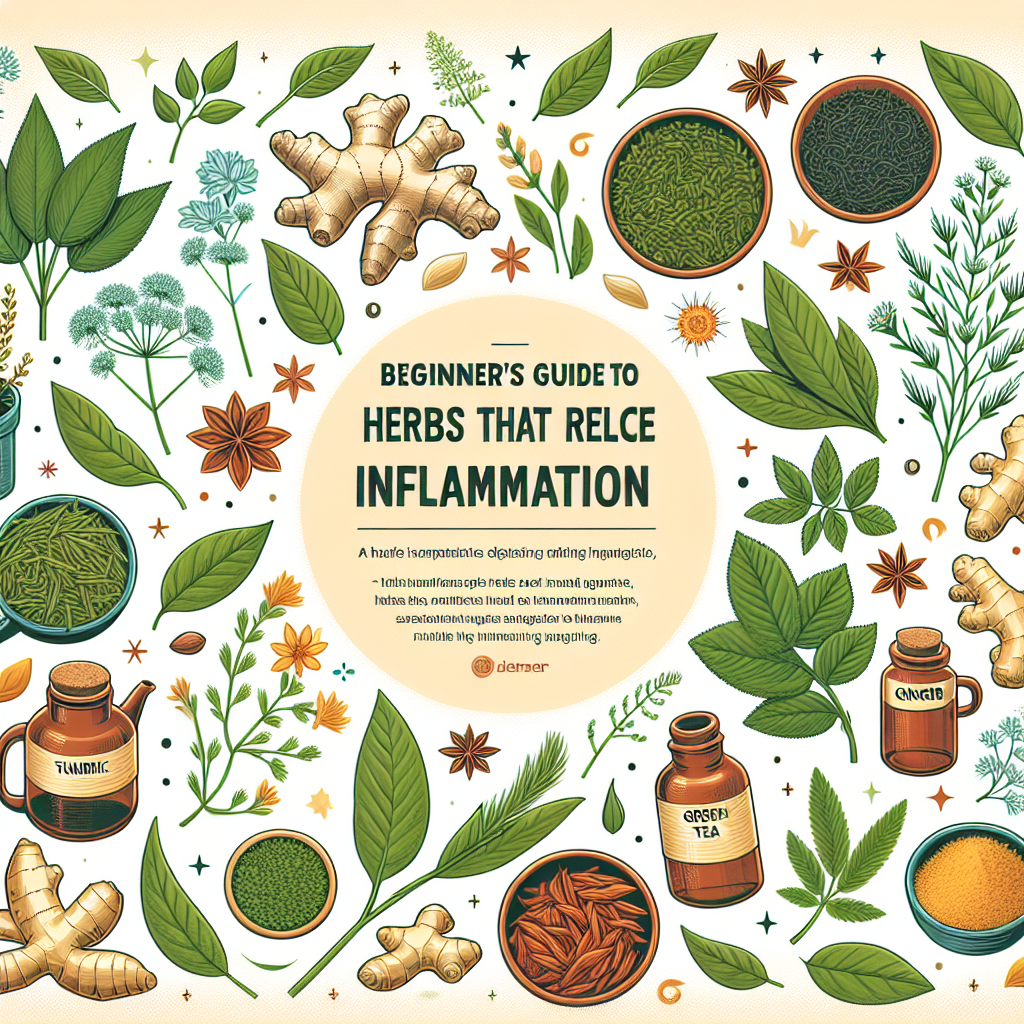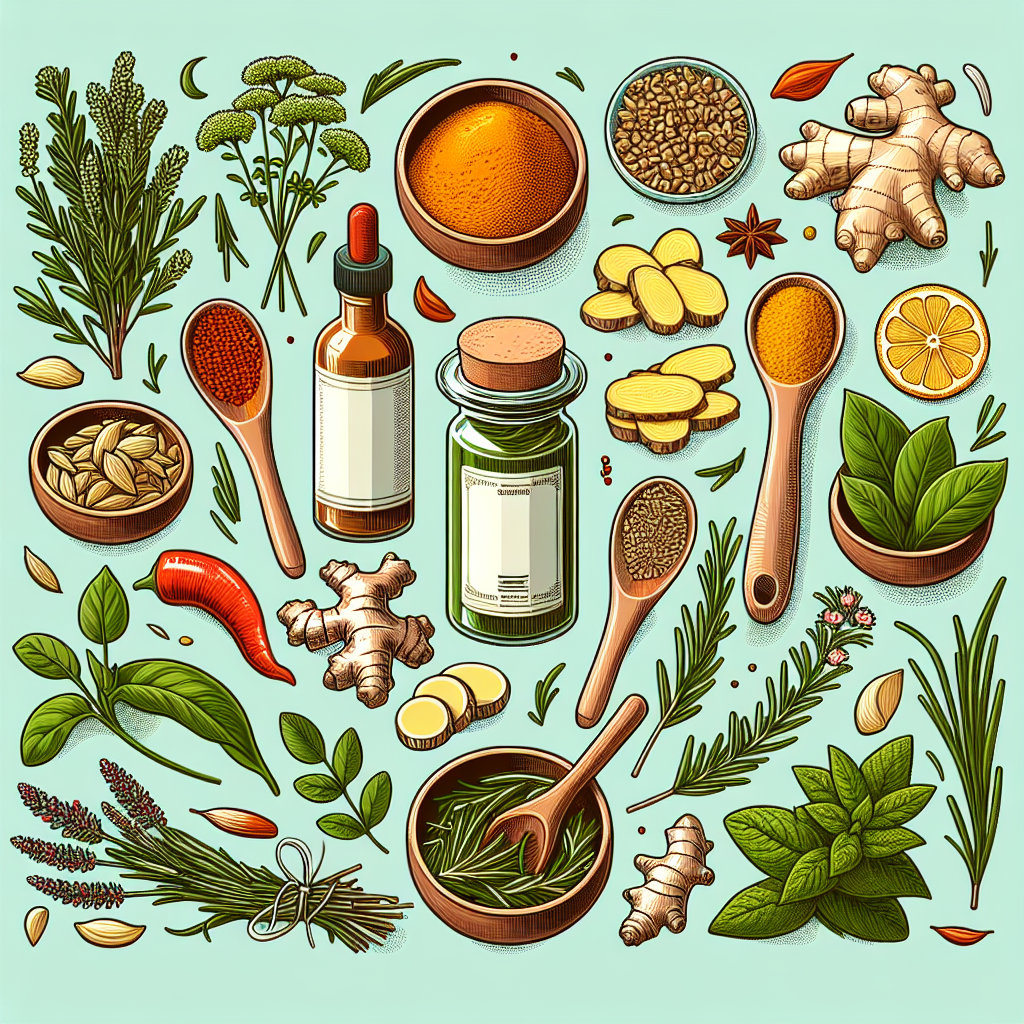Beginner’s Guide to Herbs That Help Reduce Inflammation

Discover the power of nature with our Beginner’s Guide to Herbs That Help Reduce Inflammation. Learn how to incorporate these healing herbs into your daily routine for a healthier, inflammation-free life. Start your journey towards vibrant vitality today!
Understanding the Basics: Top Herbs for Inflammation Reduction for Beginners
Inflammation is a natural response of the body to injury or illness, acting as a protective measure to help the body heal. However, chronic inflammation can lead to various health issues, including heart disease, diabetes, and arthritis. Fortunately, nature provides us with a plethora of herbs that can help reduce inflammation and promote overall health. This beginner’s guide will introduce you to some of the top herbs for inflammation reduction.
Turmeric, a vibrant yellow spice commonly used in Indian cuisine, is renowned for its anti-inflammatory properties. The active ingredient in turmeric, curcumin, has been extensively studied for its potent anti-inflammatory effects. It works by inhibiting the activity of several enzymes involved in the inflammatory process, thereby reducing inflammation. Incorporating turmeric into your diet can be as simple as adding it to soups, stews, or even smoothies.
Next on our list is ginger, a spicy root that has been used for centuries in traditional medicine to treat various ailments. Like turmeric, ginger also contains compounds that have potent anti-inflammatory properties. These compounds, known as gingerols, work by blocking the production of chemicals that trigger inflammation in the body. Ginger can be consumed in various forms, including fresh, dried, or as a tea.
Another herb worth mentioning is rosemary. This aromatic herb is not only a staple in Mediterranean cuisine but also a powerful anti-inflammatory agent. Rosemary contains two key anti-inflammatory compounds, rosmarinic acid and carnosic acid. These compounds work by inhibiting the production of inflammatory chemicals, thereby reducing inflammation. Rosemary can be used to flavor a variety of dishes, from roasted vegetables to grilled meats.
Boswellia, also known as Indian frankincense, is another potent anti-inflammatory herb. The resin from the Boswellia tree has been used in traditional medicine for thousands of years to treat various inflammatory conditions. The active compounds in Boswellia, known as boswellic acids, have been shown to inhibit the production of inflammatory chemicals in the body. Boswellia can be taken as a supplement or used topically in the form of a cream or ointment.
Lastly, we have green tea, a beverage revered for its numerous health benefits. Green tea is rich in polyphenols, antioxidants that have strong anti-inflammatory properties. One of these polyphenols, known as epigallocatechin gallate (EGCG), has been shown to inhibit the production of inflammatory chemicals in the body. Drinking a few cups of green tea each day can help reduce inflammation and promote overall health.
In conclusion, incorporating these herbs into your diet can be a natural and effective way to reduce inflammation. However, it’s important to remember that while these herbs can help manage inflammation, they should not replace conventional medical treatment. Always consult with a healthcare professional before starting any new dietary regimen or supplement. With the right guidance and a balanced approach, these herbs can be a valuable addition to your health and wellness routine.
A Beginner’s Guide to Anti-Inflammatory Herbs: What You Need to Know

Inflammation is a natural response of the body to injury or illness. However, chronic inflammation can lead to various health issues, including heart disease, cancer, and arthritis. Fortunately, nature has provided us with a plethora of herbs that can help reduce inflammation and promote overall health. This beginner’s guide will introduce you to some of these potent anti-inflammatory herbs and provide you with the necessary information to incorporate them into your daily routine.
Firstly, let’s delve into the world of turmeric. This golden spice, a staple in Indian cuisine, is renowned for its anti-inflammatory properties. The active ingredient in turmeric, curcumin, has been scientifically proven to reduce inflammation at the molecular level. Incorporating turmeric into your diet can be as simple as adding it to your favorite dishes or drinking it as a tea. However, curcumin is not easily absorbed by the body, so it’s recommended to consume it with black pepper, which contains piperine, a natural substance that enhances curcumin absorption.
Next on our list is ginger, a root that has been used for centuries in traditional medicine to treat various ailments. Like turmeric, ginger also has powerful anti-inflammatory properties. Studies have shown that ginger can reduce inflammation and alleviate pain in individuals with osteoarthritis. You can enjoy ginger in various forms, such as fresh, dried, or as an oil. Adding it to your meals or sipping on ginger tea can provide you with its health benefits.
Another herb worth mentioning is rosemary. This aromatic herb is not only a great addition to your culinary endeavors but also a potent anti-inflammatory agent. Rosemary contains two powerful anti-inflammatory compounds, carnosic acid and carnosol. These compounds have been shown to inhibit the production of pro-inflammatory cytokines, which are proteins that promote inflammation. You can use rosemary in your cooking or brew it into a soothing tea.
Lastly, let’s talk about green tea. This popular beverage is packed with antioxidants known as catechins, which have anti-inflammatory effects. The most potent catechin in green tea is epigallocatechin-3-gallate (EGCG), which has been shown to reduce inflammation by lowering the production of pro-inflammatory cytokines and enzymes. Drinking a few cups of green tea each day can help you reap its anti-inflammatory benefits.
In conclusion, incorporating anti-inflammatory herbs into your diet can be a natural and effective way to combat inflammation. However, it’s important to remember that while these herbs can help reduce inflammation, they should not replace any prescribed medications or treatments. Always consult with a healthcare professional before starting any new dietary regimen. Furthermore, these herbs are most effective when combined with a balanced diet and regular exercise. So, start exploring these herbs and discover how they can enhance your health and well-being.
Starting Your Herbal Journey: Essential Herbs for Reducing Inflammation
Inflammation is a natural response of the body to injury or illness, but when it becomes chronic, it can lead to serious health issues such as heart disease, diabetes, and cancer. Fortunately, nature has provided us with a plethora of herbs that can help reduce inflammation and promote overall health. As you embark on your herbal journey, it’s essential to familiarize yourself with these potent plants and their healing properties.
Turmeric, a vibrant yellow spice commonly used in Indian cuisine, is one of the most powerful anti-inflammatory herbs known to science. Its active ingredient, curcumin, has been shown to be as effective as some anti-inflammatory drugs, without the side effects. Incorporating turmeric into your diet can be as simple as adding it to soups, stews, or smoothies, or taking it as a supplement.
Ginger, another spice widely used in Asian cooking, is also renowned for its anti-inflammatory properties. It contains compounds called gingerols, which have been found to reduce inflammation and relieve pain. Ginger can be consumed fresh, dried, or in tea form, and is particularly effective in alleviating digestive inflammation.
Rosemary, a fragrant herb often used in Mediterranean cuisine, is not only a culinary delight but also a potent anti-inflammatory agent. It contains rosmarinic acid and carnosic acid, two compounds that have been shown to suppress inflammation. Adding rosemary to your meals not only enhances their flavor but also boosts their health benefits.
Green tea, while not technically an herb, is worth mentioning for its powerful anti-inflammatory properties. It is rich in polyphenols, antioxidants that fight inflammation and protect cells from damage. Drinking a few cups of green tea a day can help reduce inflammation and lower the risk of chronic diseases.
Lastly, there’s Boswellia, also known as Indian frankincense, which has been used for centuries in Ayurvedic medicine to treat inflammatory conditions. It contains boswellic acids, which inhibit the production of inflammatory enzymes. Boswellia can be taken as a supplement or used topically in the form of an essential oil.
While these herbs can be effective in reducing inflammation, it’s important to remember that they are not a substitute for a healthy lifestyle. Regular exercise, a balanced diet, adequate sleep, and stress management are all crucial in maintaining optimal health and keeping inflammation at bay.
Moreover, before starting any herbal regimen, it’s advisable to consult with a healthcare professional, especially if you have a pre-existing condition or are taking medication. Some herbs can interact with certain drugs and cause adverse effects, so it’s always best to err on the side of caution.
In conclusion, herbs offer a natural, safe, and effective way to reduce inflammation and promote overall health. Whether you’re a seasoned herbalist or a beginner, incorporating these herbs into your daily routine can make a significant difference in your well-being. So why not start your herbal journey today and discover the healing power of nature? With a little knowledge and a lot of curiosity, you can harness the power of these potent plants and pave the way for a healthier, happier life.